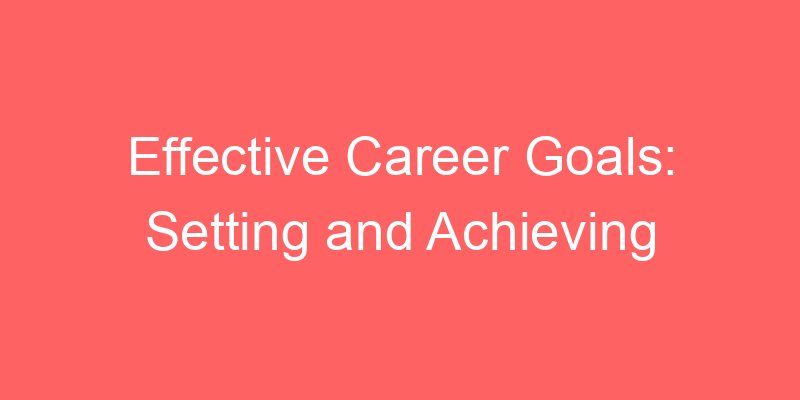Chart Your Course: Setting Effective Career Goals
Having a clear sense of direction is crucial for success in any endeavor, and your career is no exception. Career goals act as your roadmap, guiding you towards a fulfilling and prosperous professional life. This article will equip you with the tools and strategies to set effective career goals and propel yourself forward.
**The Power of Career Goals
Career goals provide a multitude of benefits:
- Motivation and Focus: When you have a clear vision of what you want to achieve, you’re more likely to stay motivated and persevere through challenges.
- Improved Decision-Making: Career goals help you make informed decisions about your career path. They allow you to evaluate opportunities that align with your long-term aspirations.
- Increased Confidence: Achieving your career goals builds confidence and a sense of accomplishment, propelling you towards even greater success.
Example: Imagine you’re a recent graduate with a degree in marketing. A vague goal might be “to get a marketing job.” A more effective career goal could be “to secure a position as a marketing associate at a fast-growing tech company within the next year. In this role, I want to gain experience in social media marketing and content creation.” This specific goal provides direction and allows you to tailor your job search and skill development accordingly.
Setting Career Goals You Can Achieve
Here are key steps to setting effective career goals:
- Self-Assessment: Start with introspection. What are your strengths, interests, and values? Consider what kind of work environment you thrive in and the impact you want to make.
- Short-Term vs. Long-Term: Establish a healthy mix of short-term (achievable within 1-2 years) and long-term (5+ years) goals. Short-term goals provide a sense of accomplishment and keep you on track, while long-term goals provide a guiding vision.
- Specificity is Key: The more specific your goals, the better. Instead of aiming for a “management position,” set a goal to “become a marketing manager within 3 years, leading a team of 5 and overseeing all social media campaigns.”
**The SMART Formula for Career Goals
The SMART framework provides a helpful structure for crafting effective career goals:
- Specific: Clearly define your goals. What do you want to achieve?
- Measurable: Establish metrics to track your progress. How will you know you’ve reached your goal?
- Attainable: Be ambitious, but realistic. Set goals that challenge you, but are achievable with hard work and dedication.
- Relevant: Ensure your goals align with your overall interests and values.
- Time-Bound: Set a specific timeframe for achieving your goals. This creates a sense of urgency and keeps you accountable.
Example: Let’s revisit the marketing associate goal. Using the SMART formula, we can refine it to: “Secure a position as a marketing associate at a fast-growing tech company within the next year. In this role, I will gain experience in social media marketing and content creation. I will measure my progress by successfully managing two social media campaigns and creating 10 blog posts within the first 6 months.”
**Taking Action on Your Career Goals
Setting goals is just the first step. Here’s how to turn them into reality:
- Develop an Action Plan: Break down your long-term goals into smaller, actionable steps. This makes them less overwhelming and provides a clear roadmap for progress.
- Continuous Learning: Never stop learning and developing new skills. Take courses, attend workshops, and network with professionals in your field to stay ahead of the curve.
- Track Your Progress: Regularly assess your progress. Celebrate your achievements and identify areas where you can improve.
Career goals are a powerful tool for charting your professional course. By following these steps and taking consistent action, you can transform your career goals into a fulfilling professional reality.
Chart Your Course: Setting Powerful Career Goals
Having clear career goals is like having a roadmap to your dream job. They provide direction, keep you motivated, and help you measure your progress. But with so many possibilities, where do you begin? Here, we’ll explore two approaches to setting effective career goals:
Example 1: The Skill-Focused Climber
This approach prioritizes developing new skills to reach your desired career level.
- Identify Your Target Role: The first step is to pinpoint the specific job title or role you aspire to. Research the required skills and qualifications for this position.
- Develop a Skill-Building Plan: Once you understand the necessary skillset, create a plan to acquire those skills. This might involve taking online courses, attending workshops, or seeking mentorship opportunities.
- Set SMART Goals: Frame your goals using the SMART method: Specific, Measurable, Achievable, Relevant, and Time-bound. For instance, a SMART goal could be, “Complete an online course in data analysis by [date] to enhance my qualifications for data scientist positions.”
Example 2: The Impact-Driven Achiever
This approach focuses on the impact you want to make in your career.
- Define Your Values: Reflect on your values and what kind of impact you want to have on the world through your work. Do you value innovation? Social good? Helping others?
- Align Goals with Values: After identifying your values, set goals that align with them. Maybe you want to “Lead a team that develops sustainable energy solutions within the next five years” or “Become a project manager for a non-profit organization by [date].”
- Track Your Progress: Regularly assess your progress towards your goals. Celebrate your achievements and adjust your approach as needed.
Remember, the best career goals are a blend of skill development and impact**. Setting goals that challenge you and align with your values will keep you engaged and moving forward in your career journey.
pet=”blog-button1″]
ippet=”blog-button2″]
Generate Your NEXT Resume with AI
Accelerate your resume crafting with the AI Resume Builder. Create personalized resume summaries in seconds.


![Read more about the article Job Waiting Period:[21] Strategies for Managing the Waiting Game](https://yournextresume.com/wp-content/uploads/2024/08/job-waiting-period21-strategies-for-managing-the-waiting-game_4882-300x150.png)
![Read more about the article Negotiate a Salary:[21] Master the Art of Negotiating Your Pay](https://yournextresume.com/wp-content/uploads/2024/08/negotiate-a-salary21-master-the-art-of-negotiating-your-pay_4923-300x150.png)
